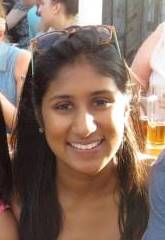What’s life like at a leading global provider of information and analytics around consumer behavior, also known as Nielsen? Join alum, Sarada Bheemineni, SEAS ’10, on Tuesday, February 11th when she tweets for @PennCareerDay. Learn about her career with Nielsen, advice for joining the field of consumer behavior and analytics, and understand what it’s like to be part of the Nielsen team. Did you know that Nielsen will be at the Spring Career Fair? Well, if you didn’t, this is a really great opportunity to help you prep for a visit to the Nielsen table, too. To learn more about Sarada, read her bio below. Don’t forget to follow her on the 11th, either!
 Sarada Bheemineni is an Associate Manager, Innovation Analytics at Nielsen, a leading global provider of information and analytics around consumer behavior. In her role, Sarada advises clients on their brand and innovation strategy using data-driven insights. This involves consulting clients on category and marketplace trends, as well as drivers of global consumer demand. Key clients include Colgate-Palmolive, Hershey, and PepsiCo.
Sarada Bheemineni is an Associate Manager, Innovation Analytics at Nielsen, a leading global provider of information and analytics around consumer behavior. In her role, Sarada advises clients on their brand and innovation strategy using data-driven insights. This involves consulting clients on category and marketplace trends, as well as drivers of global consumer demand. Key clients include Colgate-Palmolive, Hershey, and PepsiCo.
Sarada has been with Nielsen since graduating from Penn in 2010, where she studied Materials Science and Engineering and Economics. Sarada currently lives in New York City and in her free time enjoys running, exploring the city, traveling to other countries, and watching Mad Men.


